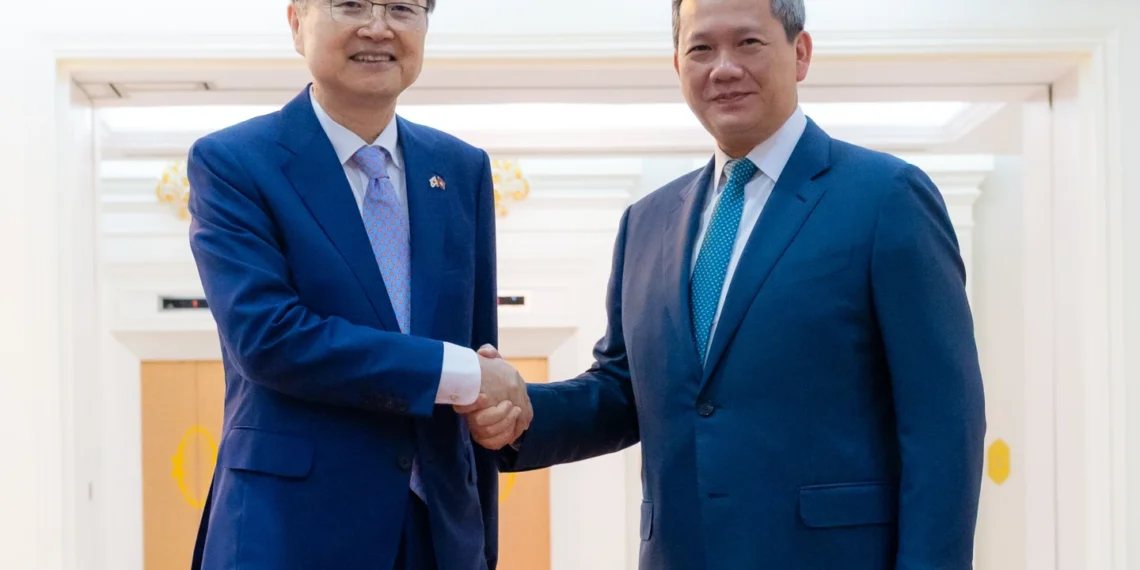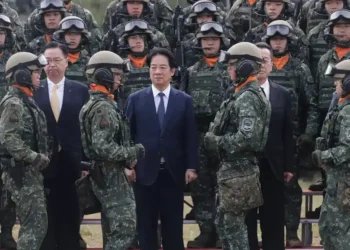PHNOM PENH, Cambodia — South Korea’s Foreign Minister Cho Hyun met with Cambodian Prime Minister Hun Manet on Monday to strengthen joint efforts against large-scale online scam syndicates operating across Southeast Asia. The discussions followed growing outrage in South Korea over the death of a 22-year-old student allegedly trafficked into a criminal scam network in Cambodia.
Hun Manet confirmed the meeting in a social media post, noting that the two leaders discussed cooperation and law enforcement coordination, though he did not provide details. South Korea’s Ministry of Foreign Affairs said Cho’s visit aimed to “enhance bilateral collaboration to eliminate cyberscam-related crimes” and to formalize plans for a joint police task force. Cho is scheduled to return to Seoul on Tuesday.
Death of South Korean Student Triggers Diplomatic Response
The diplomatic push came after the death of Park Min-ho, a South Korean national reportedly deceived by false job offers and forced to work in a scam center in Cambodia before being found tortured and beaten to death in August. His killing sparked public outrage in South Korea and heightened scrutiny of transnational cybercrime operations in the region.
Following Park’s death, Seoul dispatched a special delegation to Phnom Penh to demand stronger protection for foreign nationals and greater crackdowns on criminal networks believed to be operating with impunity in parts of Cambodia.
Southeast Asia Emerges as a Hub for Cyberscam Operations
Online scam syndicates have proliferated across Southeast Asia in recent years, exploiting weak law enforcement and porous borders. According to the United Nations Office on Drugs and Crime (UNODC), such operations have evolved into a form of human trafficking, trapping thousands of people — including foreign workers — inside heavily guarded compounds. Victims are often lured through false job advertisements and coerced into running online scams under threat of violence.
International agencies estimate that cybercrime networks in the region generate billions of dollars annually, defrauding victims worldwide through investment schemes, romance scams, and fake cryptocurrency ventures.
In Cambodia alone, South Korean officials estimate there are around 200,000 workers in scam centers, including approximately 1,000 South Korean nationals.
Joint Law Enforcement Efforts Underway
Seoul’s foreign ministry has prioritized the establishment of a joint investigative framework with Cambodia to identify and rescue Korean nationals trapped in such compounds. South Korea has also sought support from Interpol and ASEAN member states to coordinate broader anti-cybercrime operations.
Last month, 64 South Koreans detained by Cambodian authorities were repatriated to Seoul aboard a chartered flight. About 50 of them were later arrested upon arrival on charges of participating in online fraud schemes, underscoring the complex challenge of distinguishing between victims and perpetrators in these transnational operations.
“Cyberscams have become one of the fastest-growing transnational crimes in Asia, and regional cooperation is vital,” said a South Korean foreign ministry official. “Our government is determined to protect citizens and assist Southeast Asian authorities in dismantling these networks.”
Human Trafficking and Digital Fraud Intersect
Rights groups, including Human Rights Watch and UNICEF, have warned that the surge in online scams has blurred the line between cybercrime and human trafficking. Reports from the UN Human Rights Office describe widespread cases of abduction, debt bondage, and forced labor in compounds located in Cambodia, Myanmar, and Laos.
Authorities in Phnom Penh have launched several raids over the past year, rescuing both local and foreign workers. However, experts say sustained cross-border law enforcement, financial tracking, and technological cooperation are needed to fully disrupt the operations.
For South Korea, the issue is increasingly seen not only as a criminal matter but also a diplomatic and human rights concern — one that demands continued engagement with Southeast Asian partners to combat cyber-enabled exploitation and transnational crime.
This article was rewritten by JournosNews.com based on verified reporting from trusted sources. The content has been independently reviewed, fact-checked, and edited for accuracy, neutrality, tone, and global readability in accordance with Google News and AdSense standards.
All opinions, quotes, or statements from contributors, experts, or sourced organizations do not necessarily reflect the views of JournosNews.com. JournosNews.com maintains full editorial independence from any external funders, sponsors, or organizations.
Stay informed with JournosNews.com — your trusted source for verified global reporting and in-depth analysis. Follow us on Google News, BlueSky, and X for real-time updates.














